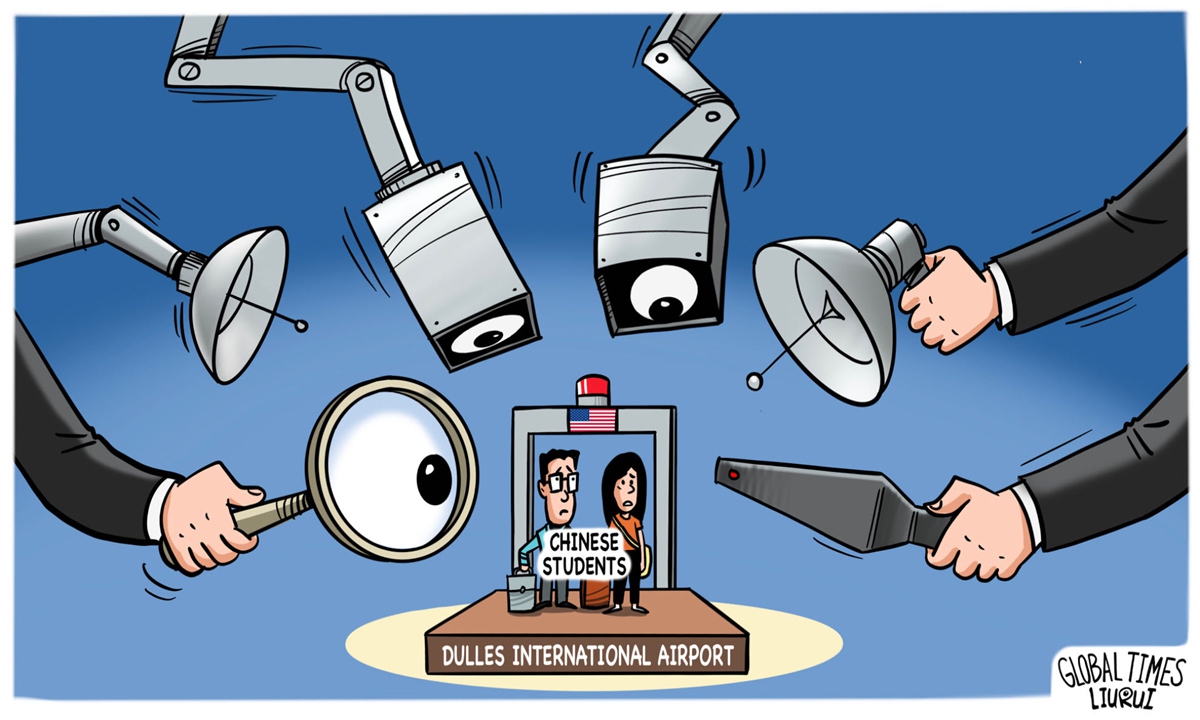
Illustration: Liu Rui/GT
Many Chinese students interested in STEM (science, technology, engineering, and mathematics) look to the US as their destination for further education. Unfortunately, their plans for a US STEM education are increasingly thwarted – not so much by exorbitant tuition fees, but by the shifting stance of the US' foreign policy.
"I would like to see more Chinese students coming to the US to study humanities and social sciences, not particle physics," said US Deputy Secretary of State Kurt Campbell at a recent think tank event. Such remarks reflect the US government’s growing reluctance for Chinese nationals to access any of its advanced technologies amid escalating tensions with China, which the US has groundlessly accused of espionage and intellectual property theft.
The curbs on Chinese students' academic pursuits are merely the tip of the iceberg. The US has deployed a wide range of measures as roadblocks, including the Presidential Proclamation 10043, which allows visa officers to deny visas based on the applicant’s field of study, alma mater or funding sources. Similarly, the China Initiative, concocted during the Donald Trump administration, has further intensified such scrutiny by targeting scientists with alleged connections to China. An overwhelming 90 percent of those charged under this scheme are of Chinese descent. High-profile cases, such as the one about an MIT professor accused of hiding contracts and awards from Chinese entities while receiving federal grants, have sown seeds of fear, prompting an exodus of talent.
Chinese students also face serious Sinophobia at US entry points. The Chinese Embassy in Washington reports nearly 300 incidents of undue harassment and interrogation by the US, including over 70 international students, between July 2021 and April 2024. These students, holding legal and valid entry materials, were forced to endure long hours of questioning in isolated rooms with their electronic devices scrutinized. There are even cases where students were forcibly deported. The situation at Washington Dulles Airport is particularly alarming, with at least 10 cases of Chinese students being harassed and repatriated since November 2023.
Despite all these disturbing incidents in the US, figures like Deputy Secretary of State Kurt Campbell and US Ambassador to China Nicholas Burns are instead blaming the decline in China-US exchanges on Beijing's policies. According to Ambassador Burns, visa-holding Chinese students face no issues when entering the US, and it was Chinese officials who have been hindering normal interactions between Chinese and US citizens. This could not be further from the truth.
China sees student exchanges as an important part of its cooperation with the US and believes that successful academic interactions can contribute to the shared success of both countries. The San Francisco summit highlighted the significance of people-to-people exchanges. China's invitation to 50,000 US students in the next five years and the ongoing study groups already in China reflect this commitment.
However, the US seems to have backpedaled on this common understanding. Denying Chinese students access to STEM education not only undermines academic freedom but also betrays US anxieties about China's tech rise. US actions in recent years such as the sweeping ban on Huawei, the legislation forcing ByteDance to divest TikTok, and the steep tariffs on Chinese EVs, are all aimed at stifling China’s high-tech development, pointing to a strategy of containment rather than collaboration.
The US prides itself on being a melting pot where diverse talents from around the world can come together and pursue their dreams. This tradition of inclusiveness and diversity has been a magnet for talent and a driver of scientific and technological progress for the US in the past decades. Unfortunately, this fine US tradition is being eroded. By marginalizing Chinese students and cutting off communication and cooperation in the high-tech sector, the US is walling itself in, seeking a false sense of security through a zero-sum approach to scientific and technological innovation.
Here is the question: Isn’t fair competition and the free flow of ideas the real catalyst of innovation? Does hindering China's progress truly benefit the US as a technological leader?
What is more, the treatment of Chinese students serves as a wake-up call for the broader community of international students in the US. Academic protectionism may not target China alone – it's a strategy that could be deployed against any nation viewed as a threat to US primacy.
The author is a commentator on international affairs, writing regularly for Xinhua News Service, CGTN, Global Times, China Daily, etc. He can be reached at xinping604@gmail.com.
